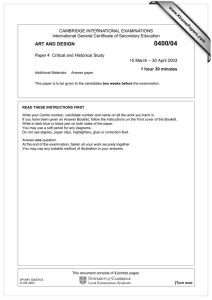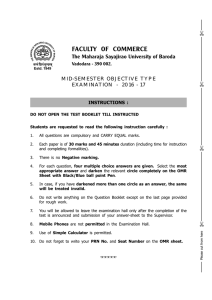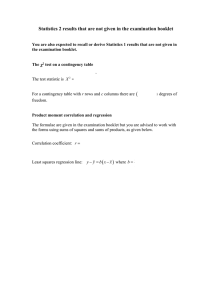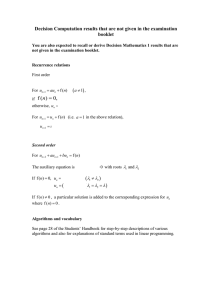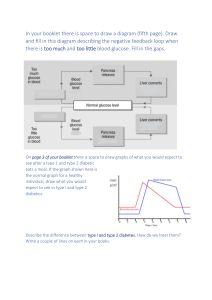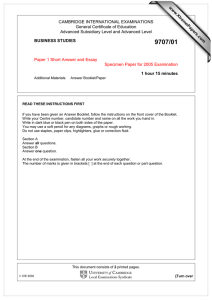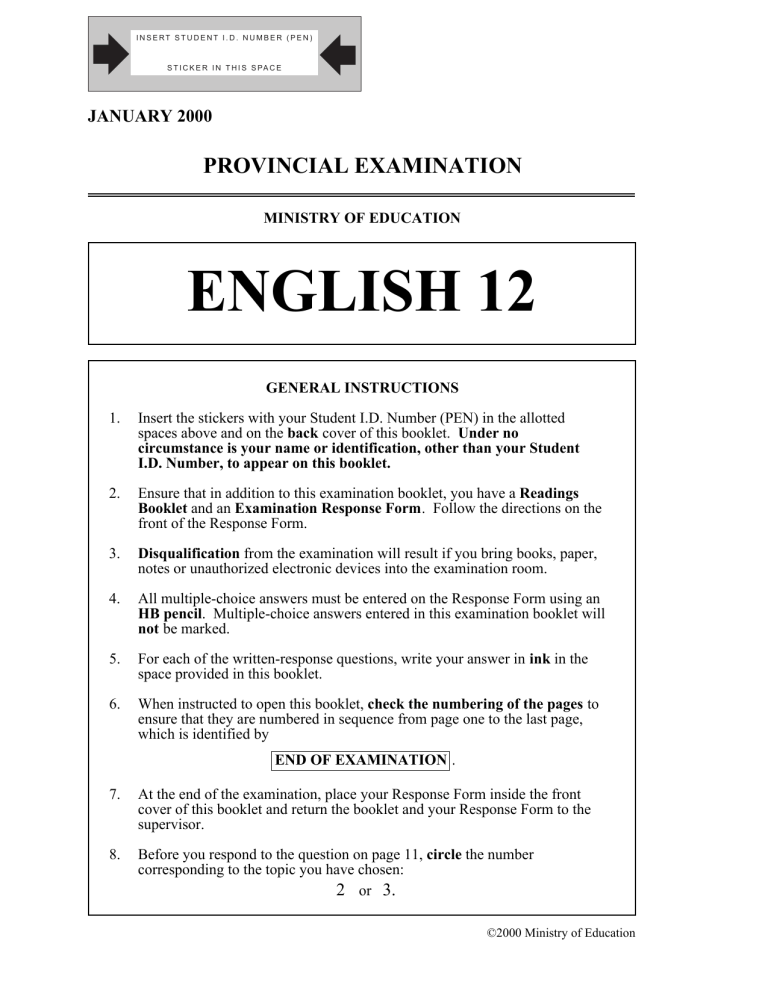
INSERT STUDENT I.D. NUMBER (PEN) S T I C K E R I N T H I S S PA C E JANUARY 2000 PROVINCIAL EXAMINATION MINISTRY OF EDUCATION ENGLISH 12 GENERAL INSTRUCTIONS 1. Insert the stickers with your Student I.D. Number (PEN) in the allotted spaces above and on the back cover of this booklet. Under no circumstance is your name or identification, other than your Student I.D. Number, to appear on this booklet. 2. Ensure that in addition to this examination booklet, you have a Readings Booklet and an Examination Response Form. Follow the directions on the front of the Response Form. 3. Disqualification from the examination will result if you bring books, paper, notes or unauthorized electronic devices into the examination room. 4. All multiple-choice answers must be entered on the Response Form using an HB pencil. Multiple-choice answers entered in this examination booklet will not be marked. 5. For each of the written-response questions, write your answer in ink in the space provided in this booklet. 6. When instructed to open this booklet, check the numbering of the pages to ensure that they are numbered in sequence from page one to the last page, which is identified by END OF EXAMINATION . 7. At the end of the examination, place your Response Form inside the front cover of this booklet and return the booklet and your Response Form to the supervisor. 8. Before you respond to the question on page 11, circle the number corresponding to the topic you have chosen: 2 or 3. ©2000 Ministry of Education THIS PAGE INTENTIONALLY BLANK ENGLISH 12 PROVINCIAL EXAMINATION Value Suggested Time 10 19 32 24 10 25 40 45 1. This examination consists of four parts: PART A: PART B: PART C: PART D: Editing and Proofreading Skills Interpretation of Literature: Poetry Interpretation of Literature: Prose Original Composition Total: 85 marks 120 minutes 2. Electronic devices, including dictionaries and pagers, are not permitted in the examination room. 3. The Readings Booklet contains the prose and poetry passages you will need to answer certain questions on this examination. 4. This examination is designed to be completed in two hours. Students may, however, take up to 30 minutes of additional time to finish. Use your time wisely. 5. Adequate writing space has been provided for average-sized writing. Do not attempt to determine the length of your answers by the amount of writing space available. 6. Ensure that you use language and content appropriate to the purpose and audience of this examination. Failure to comply may result in your paper being awarded a zero. OVER -1- PART A: EDITING AND PROOFREADING SKILLS Total Value: 10 marks Suggested Time: 10 minutes INSTRUCTIONS: The following passage has been divided into numbered sentences which may contain problems in grammar, usage, word choice, spelling, or punctuation. One or more sentences may be correct. No sentence contains more than one error. If you find an error, select the underlined part that must be changed in order to make the sentence correct and record your choice on the Response Form provided. Using an HB pencil, completely fill in the circle that corresponds to your answer. If there is no error, completely fill in circle D (no error). LOST IN THE MOUNTAINS 1. With the development of new technology, such as sophisticated mountain bikes , (A) four-track vehicles, and powerful snowmobiles; our ability to access many (B) remote areas has become much easier than before. (C) 2. Because more outdoor enthusiasts are venturing into BC’s wilderness (A) areas, the number of people getting lost, injured, or killed (B) have also increased dramatically over the past five years. (C) 3. Of all the outdoor adventures, the activities that have claimed more victims than (A) (B) any other are skiing and snowboarding, the number of fatalities has doubled (C) each year for the past three years. 4. A recent survey conducted by Search and rescue concluded that every year (A) approximately one hundred people are rescued from BC’s backcountry and (B) that an additional ten people are killed in wilderness areas each season. (C) -2- (D) no error (D) no error (D) no error (D) no error 5. The survey also stated that nearly all attempted rescues occur just outside (A) the boundaries of ski resorts in areas that are either roped off or (B) were clearly identified as avalanche areas. (C) 6. Once skiers have roamed outside of the controlled ski area, they may (A) encounter many potentially fatal situations such as getting lost in snow and fog, (B) falling into a tree well, or be hit by an avalanche. (C) 7. Terry Le Blanc, a professional ski patroller, explains, (A) “Most young people who become lost or injured while skiing or boarding often (B) tend to ignore the dangers in exchange for tracking untouched powder snow.” (C) 8. Le Blanc suggests that anyone whom plans to ski in remote areas should take (A) courses in orienteering, avalanche control, and outdoor safety to help reduce the risk (B) (C) of getting lost or killed. 9. Le Blanc also notes that experienced mountaineers are now equipped with the latest (A) high-tech gadgets, such as global positioning devices and transmitters, which (B) are used to locate there current position on Earth within ten square metres. (C) 10. Before you decide to venture into the wilderness plan your trip carefully to ensure (B) (A) that your next excursion into the great outdoors will be a positive experience. (C) (D) no error (D) no error (D) no error (D) no error (D) no error (D) no error OVER -3- PART B: POETRY Total Value: 19 marks Suggested Time: 25 minutes INSTRUCTIONS: Read the poem “Death Over Water” on page 1 in the Readings Booklet. Select the best answer for each question and record your choice on the Response Form provided. 11. The mood implied in lines 11 to 12, “spreading his dark arms above / his partner’s every move,” is A. B. C. D. angry. loving. playful. ominous. 12. In line 20, the speaker refers to the crows as “scraps of scorched confetti” because they are A. B. C. D. black in colour. burned by the sun. losing their feathers. attacked by the eagle. 13. In line 28, the phrase “coup de grace” is in italics because it is A. B. C. D. quoted. foreign. scientific. colloquial. 14. The speaker believes that the eagle kills the gull by A. B. C. D. drowning it. exhausting it. sinking its beak into it. knocking it out of the air. 15. In relation to line 1, line 37 is A. B. C. D. a climax. a contrast. an analogy. an allusion. -4- 16. The irregular placement of lines on the page suggests the A. B. C. D. rhythm and rhyme. omission of punctuation. steady flight of the crows. struggle between the two birds. 17. The poem is A. B. C. D. satiric. didactic. pastoral. narrative. OVER -5- Death Over Water (page 1 in the Readings Booklet) INSTRUCTIONS: In paragraph form and in approximately 125 to 150 words, answer question 1 in the space provided. Write in ink. The mark for your answer will be based on the appropriateness of the example(s) you use as well as the adequacy of your explanation and the quality of your written expression. 1. Throughout the poem, the poet compares the relationship between the eagle and the gull to “a pair of ice dancers.” In paragraph form and with reference to the poem, discuss the poet’s use of the extended metaphor of ice dancing. (12 marks) -6- Organization and Planning SUBTOTAL 1st 2nd OVER -7- PART C: PROSE Total Value: 32 marks Suggested Time: 40 minutes INSTRUCTIONS: Read the passage entitled “The Hallowe’en Party” on pages 2 to 4 in the Readings Booklet. Select the best answer for each question and record your choice on the Response Form provided. 18. The narrator’s father bought a farm because he A. B. C. D. had quit his job. needed a hobby. preferred farming to city life. wanted to move his machine shop there. 19. On their first visit to the farm, the children went to search for A. B. C. D. frogs. water. neighbours. mushrooms. 20. In paragraph 7, “her eyes looked out as clear and flawless as aquamarines” is an example of A. B. C. D. simile. paradox. alliteration. onomatopoeia. 21. What the Lurias and MacNeills had in common was they were both A. B. C. D. Jewish. Scottish. immigrants. from Winnipeg. 22. Mr. Luria objects to the children attending the Hallowe’en party because it is a A. B. C. D. pagan ritual. cultural symbol. Jewish tradition. Canadian tradition. -8- 23. Dan’s conversation with Mr. Luria (paragraphs 20 to 34) reveals Dan to be A. B. C. D. arrogant. sensitive. antagonistic. sophisticated. 24. The point of view in this story is A. B. C. D. objective. omniscient. first person. limited omniscient. 25. This story could best be categorized as A. B. C. D. fantasy. escapist. suspenseful. autobiographical. OVER -9- Organization and Planning - 10 - The Hallowe’en Party (pages 2 to 4 in the Readings Booklet) INSTRUCTIONS: Choose one of the following two topics and write a multi-paragraph response of approximately 300 words. Write in ink. The mark for your answer will be based on the appropriateness of the example(s) you use as well as the adequacy of your explanation and the quality of your written expression. 2. In multi-paragraph form and with reference to the story, discuss the character of the father. OR 3. In multi-paragraph form and with reference to the story, discuss the impact of the setting on the story. Before you begin, go to the front cover of this booklet and circle the number corresponding to your chosen topic – Instruction 8. (24 marks) FINISHED WORK OVER - 11 - FINISHED WORK - 12 - FINISHED WORK SUBTOTAL 1st 2nd OVER - 13 - Organization and Planning - 14 - PART D: ORIGINAL COMPOSITION Value: 24 marks Suggested Time: 45 minutes INSTRUCTIONS: Using standard English, write a coherent, unified, multi-paragraph composition of approximately 300 words on the topic below. In your composition, you may apply any effective and appropriate method of development which includes any combination of exposition, persuasion, description, and narration. Use the page headed Organization and Planning for your rough work. Write your composition in ink on the pages headed Finished Work. 4. Write a multi-paragraph composition on the topic below. Your response may draw upon any aspect of your life: your reading, your own experiences, the experiences of others, and so on. Topic: Keeping an open mind allows for growth. OVER - 15 - FINISHED WORK Topic: Keeping an open mind allows for growth. - 16 - FINISHED WORK OVER - 17 - FINISHED WORK END OF EXAMINATION SUBTOTAL 1st 2nd - 18 - Question 1: . 1. (12) INSERT STUDENT I.D. NUMBER (PEN) Question 2: . 2. (24) Question 3: . 3. (24) S T I C K E R I N T H I S S PA C E Score only one of the two questions given. batch and sequence number Question 4: . 4. (24) ENGLISH 12 January 2000 Course Code = EN Use this space if I.D. sticker is not available. WRITE STUDENT I.D. NUMBER (PEN) I N T H I S S PA C E | | | | | | | | | | | | | | | | | | | | | | | | | | | | | | | | | | | | | | | | | | | | | | | | | | | | | | | | | | | ENGLISH 12 READINGS BOOKLET JANUARY 2000 ©2000 Ministry of Education THIS PAGE INTENTIONALLY BLANK PART B: POETRY INSTRUCTIONS: Read the following poem and answer the questions on pages 4 to 7 of the written-response booklet. Death Over Water by Elizabeth Rhett Woods 1 5 10 15 20 25 30 35 A clamour of crows mobbing an eagle, it seems --until I see the gull, low down and desperate, flying for its life, it swerves across the open water, striving for the open sky --but the eagle is always above and behind it, parallel, like the male of a pair of ice dancers spreading his dark arms above his partner’s every move, like that the eagle shadows the gull, drives it bleating over the bay-why does it never head for the trees? Why does it remain in that arena where the enemy has every advantage of size and speed? Perhaps it’s confused by the crows, that gallery of scalawags, those scraps of scorched confetti screeching as they swirl around the death duo spiralling lower, on every circuit I expect to see the talons sink home-but each time the gull dodges, it’s closer to the surface. It can’t go on much longer-indeed, the end’s so quick. I miss the coup de grace in passing, some bushes obscure my view-- (I have to keep walking; I have a bus to catch) --of the instant the eagle knocks the gull out of the air forever. Circling, it grabs the limp body from the water, and bears it off to a piling near the canoe club. The suddenly silent crows disperse. OVER -1- PART C: PROSE INSTRUCTIONS: Read the following passage and answer the questions on pages 8 to 13 of the written-response booklet. The Hallowe’en Party by Miriam Waddington 1 The year that I was twelve my father came home one day and announced that he had bought a farm. My sister Helen and I could hardly wait to see the farm which, according to my father, consisted of twenty-six acres in St. Vital, just beyond the outskirts of Winnipeg. There were twenty acres of bush with buildings, and six acres of meadow beside the river. My father had dreamed of such a farm all the years he was shut up in the dark greasy machine shop where he earned his living. 2 My mother was appeased by the knowledge that my father had no intention of giving up his job to move his family onto the land. That would come later. At this point he would begin to talk about his dream of a Jewish settlement on the banks of the Red River, an ideal farm community that would prove a thing or two to the world. And in his vision, we, the Lurias, were always the strongest, the busiest and the most ardent pioneers. 3 Now as I look back, I can understand my father’s deep hunger for land. Separated from his native Russia, he searched without knowing it for landscapes that were like his old home. That is why he chose to settle on the windswept plains of Manitoba. 4 The first sight of our farm was a disappointment. We saw nothing but a few fields, a whitewashed hut and an old barn. We couldn’t share my father’s enthusiasm for a mushroom bed behind the stable, or a cucumber garden beside the river. So we left him to plan his crops while we wandered down to the river’s edge. There was nothing to interest us here either, and so we decided to go frog-hunting. 5 Our frog hunt brought us to a wooded grove, and after winding in and out, we found ourselves looking down into a gully. We skirted it, and as we came around the curve we could see ahead of us a tiny cottage set back in the trees. We stopped in amazement. It was so quiet and strange, finding the cottage in just that spot. 6 We stood there in silence and watched some chicks wander out of the coop to scratch in the garden. From around the corner came a kitten, and then the barking of a dog, followed by a woman’s voice. 7 The voice was old and sturdy like its owner. Over her face, to shade it from the sun, she wore a stringy straw hat, and under it, her eyes looked out as clear and flawless as aquamarines. She smiled at us, greeted us in a neighbourly way, and almost before we knew it, we were talking like old friends. She told us her name was Miss MacNeill and that she kept house for her brother Dan. 8 Miss MacNeill had a little trouble pronouncing our last name and rolled it over her tongue experimentally. “Luria, Luria. Now would that be some foreign name?” 9 “Well,” I told her, “not exactly; that is, we aren’t, but my father—well, he wasn’t born here, he comes from Russia.” -2- 10 “And besides,” said Helen, as though she were revealing some terrible secret, “we’re Jewish.” 11 Miss MacNeill nodded, “Well now, that’ll be like Dan and me—born in Scotland we were, and ever since we’ve been away we’re always scheming to get back.” 12 So there they were, the two of them, alone except for a boarder called John, who was cook for the construction crew working up the road. And that was how we came to know the MacNeills. 13 As the summer deepened we visited them often. Although we always called her Miss MacNeill, it wasn’t long before Dan was Dan to us, and as for John, we never knew his surname at all. 14 And then September came and we were sitting in the garden in front of the cottage, Dan whittling away at something, and Miss MacNeill busy cutting geranium slips for us to take home to our mother. Helen caught sight of the ripening pumpkins and asked Dan if he would help her make a jack o’lantern for Hallowe’en. 15 Then Dan was off on one of his stories, talking and whittling, whittling and talking. Pretty soon, John, who had been mending a pair of boots in the parlour, came out and joined us. John was no talker, but he always knew to nod in the right places. He nodded several times, and after a bit he took his pipe out of his mouth and said it would be nice if Helen and I could get my father to bring us out to the cottage on Hallowe’en night. We could then have a real old-fashioned party— and there’d be no lack of company either. Here John reeled off the names of a dozen children from the surrounding farms. 16 It all sounded wonderful, until I remembered that Helen and I probably wouldn’t be allowed to come. Apart from the fact that my father might not want to drive us out to a party so far from home, he was sure to object because Hallowe’en was not a Jewish holiday. 17 And sure enough when we brought it up that evening, my father took the position that we ought not to celebrate a Christian holiday. Although Helen and I both pointed out that Hallowe’en had nothing to do with religion, my father insisted that it was a culture symbol. 18 The MacNeills were almost as disappointed as we were. Miss MacNeill thought it a shame that my father would let a thing like being Jewish stand in the way of our having fun with other children, but Dan puffed thoughtfully on his pipe and surprised us all by saying that women couldn’t understand such things, but a man could see how another man wouldn’t want to lose the one thing he had lived for all his life. 19 This seemed deep coming from Dan, and I probably wouldn’t have paid much attention to it if he hadn’t followed it up by announcing that he intended to see my father himself. 20 It was lucky for Helen and me that we happened to be hunting for a couple of pails in the barn when Dan ran into my father. We didn’t even try to resist the temptation to eavesdrop, and we heard Dan say, “Mr. Luria, there’s something I want to talk to you about.” 21 “Yes, sure, and what may it be?” That was my father. 22 “Well, it’s about your children. I guess you know that we’d like to have them come to our Hallowe’en party along with the others from the farms hereabouts.” 23 We peered through a crack in the barn and could just see my father smile. OVER -3- 24 “I know you mean well, Mr. MacNeill. You and your sister, you must be kind people. Helen and David tell us how they enjoy it at your house—and I don’t want you to think it is anything we have against you as people.” 25 Dan didn’t seem to have any trouble understanding my father’s accent, and said right off that he was glad it was nothing like that. “We won’t keep the children late, and if it’s that you’re worried about, why, you and Mrs. Luria are more than welcome to come, too!” 26 My father laughed. 27 “But thank you, no—what would we do at a Hallowe’en party? No, it isn’t that either.” And here his voice came slower. He began to frown the way he usually did when he was serious. 28 “You look to me like an honest man, Mr. MacNeill, so I’m going to tell you the truth. I don’t want to start this kind of thing. I don’t want my children celebrating Christmas or going to Hallowe’en parties. Once you begin, even with a little Hallowe’en party, everything is lost. You see, we are Jewish, and I have suffered because of it. I don’t want them to forget who they are, where they belong. And here, in this country, it is easy to forget. There are so many who are forgetting. You think I like to make problems for my children, Mr. MacNeill?” 29 Dan said, “No, I don’t think you are trying to make it hard. I guess you maybe figure that it is hard—I guess I know what you mean—you want them to face it.” 30 My father said with a sigh, “That’s right, they don’t know yet, but there will be many problems.” 31 Dan nodded. He went on to tell my father that he knew it wasn’t easy, that he himself had left home and come to a new country. It was true that the language was the same, but a hundred little things were different—the songs, the food, the people. 32 “What I keep wondering about is whether it’s outside things like Hallowe’en that matter—can that change what’s inside a person? Gosh, it’s like asking a preacher to put religion into a soul when religion isn’t there already. Or like telling the devil to take it away when it is there. No sir—if you’ll excuse the example—you can’t put religion into a lad just by showing him the inside of a church.” 33 “You mean that if my children don’t feel what I want them to feel inside themselves, then keeping them away from a Hallowe’en party isn’t going to teach them?” 34 “Something like that. These things go deep, lots deeper than a Hallowe’en party. After all is said and done, in years to come they’ll only remember the fun they had at MacNeills’ one Hallowe’en. And if you don’t let them come, it’ll be childish grief that’ll stay in their minds forever.” 35 My father listened and rubbed his chin. We knew when he started that he was about to give in. So we crept out of the barn and made for the cottage to bring Miss MacNeill the good news. 36 As it turned out, Dan was right. We went to the Hallowe’en party, and bobbed for apples with the other children. Miss MacNeill told our fortunes and John produced an orange pie with licorice trimming. We played games, pulled molasses taffy and drank punch. And later, riding home in the back of my father’s truck, sleepy and tired, my mind blurred with excitement, I kept thinking of the cottage with its festoons of coloured streamers, and grinning jack o’lanterns, and I clutched my witch’s broom with a feeling of happiness. -4- ACKNOWLEDGEMENTS Woods, Elizabeth Rhett. “Death over Water.” Reprinted with permission from Elizabeth Rhett Woods. Waddington, Miriam. “The Hallowe’en Party.” The Arch of Experience. eds. Mills, Ian W. and Mills, Judith H. Holt, Rinehart and Winston of Canada, Ltd. 1987. © 1982 Miriam Waddington from Summer at Lonely Beach and Other Stories, Mosaic Press/Valley Editions 1982. -5-
